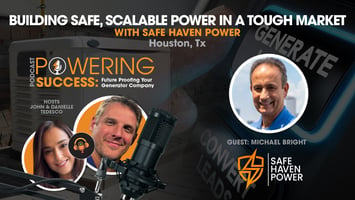Building a successful generator business isn’t just about selling equipment—it’s about engineering...
Inside Generator Power Systems (GPS): How Two Minnesota Electricians Built a Trusted Backup Power Company
When you talk to Jesse Grant and Ryan Smith of Generator Power Systems (GPS) in Minnesota, one thing becomes obvious right away: these guys didn’t just “get into” the generator business — they grew up in it.
This month on the Power Source Podcast, I sat down with the GPS team to talk about their journey from electrical apprentices to becoming one of Minnesota’s most reliable generator installation and service companies. We covered everything from their Y2K roots to their growth goals, team structure, and how their partnership has evolved over four decades of working together.
If you’re a generator dealer or thinking about becoming one this conversation is packed with insight.
A 50-Year Electrical Legacy That Sparked a Generator Brand
GPS began as a natural extension of Jim’s Electric, the Grant family business founded in 1976. Back then, nobody predicted that generators would become a core part of the future. But everything changed in the late 90s leading into Y2K.
“One of the first generators we installed was for a woman who needed an oxygen machine,” Jesse recalls. “People started asking for them, and we realized this might become more than just a side service.”
By 2010, Jesse and Ryan made the bold decision to spin off their generator division and officially launch Generator Power Systems — a company dedicated solely to installation, maintenance, and commercial/industrial backup systems.
From Apprentices to Partners
Jesse and Ryan’s working relationship spans almost 30 years. They came up in the trade together, they’ve built companies together, and they’ve navigated the harsh Minnesota seasons together.
Fun fact:
Ryan was Jesse’s journeyman for about a month.
Their skill sets complement each other perfectly:
-
Ryan leads the technical side — installs, commercial work, mechanical troubleshooting.
-
Jesse handles business operations — planning, finances, process-building, and managing the broader Jim’s Electric ecosystem.
This dual-track leadership is a big part of why GPS has grown steadily despite Minnesota’s seasonal challenges.
Why They Lead With Kohler (But Still Support Generac)
GPS is an authorized dealer for both major brands, but Kohler is their preferred residential line — and not for the reason most people assume.
“It’s the relationship,” they explained. “The factory support, the rep who visits regularly — that personal connection matters.”
For commercial units, they lean heavily on Blue Star Power Systems, a Minnesota-based manufacturer that has been a “perfect fit” for large apartments, water treatment plants, lift stations, and municipal facilities.
A Smooth, Transparent Install Experience
The GPS installation process has become something of a well-oiled machine:
-
Lead comes in
-
Brock, their dedicated sales consultant, performs a next-day site visit
-
Walkthrough: electrical loads, equipment evaluation, customer priorities
-
On-the-spot estimate
-
Install scheduled and completed within 1–2 days
-
GPS now handles their own gas piping, which dramatically shortens install timelines
-
Customer receives full training and orientation
This streamlined process is why GPS consistently hits high conversion rates and excellent customer satisfaction.
The Biggest Homeowner Misconceptions
1. “Why do I need maintenance? It barely runs!”
Minnesota cold means moisture + sub-zero temps = milky, contaminated oil.
Annual service is not optional — it’s essential for reliability.
2. “Costco has a generator for $6,000 — why are installs $12,000+?”
Because that $6K price tag doesn’t include:
-
Cold weather kits
-
Battery heaters
-
Local code requirements
-
Tax
-
Concrete pad
-
Wiring, trenching, transfer switch
-
Labor
-
Commissioning
-
Warranty support
When GPS breaks down the quote line-by-line, homeowners immediately understand the real cost.
Seasonality Drives Everything in Minnesota
Midwest generator demand follows a very specific rhythm:
-
Summer: busy with cabin owners and lake homes
-
Fall: the “oh shoot, winter’s coming” rush
-
Early winter: installs + service calls, frozen ground, thawing equipment
-
Mid-late winter: heavy maintenance season
-
Spring: early planning, delayed projects
-
Year-round: commercial service contracts
The fall season, especially, creates a massive surge when homeowners realize winter is around the corner.
How a Dedicated Salesperson Changed Everything
Before Brock joined GPS:
-
Sales appointments were often delayed 1–2 weeks
-
Many prospects went elsewhere
-
Quotes were slower to produce
-
Follow-up was inconsistent
Now:
-
Same-day or next-day consultations
-
Faster quoting via CRM + digital pricebook
-
Automated follow-ups through Power Source
-
Brock is spending more time with serious buyers instead of chasing ghost leads
“Even if we’re not getting more leads overall, they’re definitely better leads,” Jesse shared. “Our quality has gone way up.”
The Story Every Generator Dealer Hopes for
One of GPS’s clients had the ultimate generator experience:
A major storm tore through northern Minnesota overnight — trees everywhere, neighbors calling for help.
He had no idea the power was out.
The generator ran all night.
Silently. Automatically.
Exactly the way it’s supposed to.
Those are the installs that turn customers into lifelong fans.
Competing Against the Big Guys
Minnesota hasn’t seen the same surge of private-equity-backed generator giants that states like Texas or Florida have — but the GPS team still competes with large, high-overhead companies.
Their advantage?
-
Lower overhead
-
Local technicians
-
Faster response times
-
Personalized service
-
Strong community reputation
-
Better long-term value
As Jesse put it:
“We use our size to our advantage.”
Where GPS Is Headed in the Next Five Years
They’re aiming to:
-
Double their team size
-
Expand year-round service capacity
-
Improve budgeting, forecasting, and KPIs
-
Grow both residential and commercial segments
-
Give their techs more opportunities to specialize
-
Strengthen their digital presence and lead flow
After decades in the field, they’re finally embracing the business-side systems that allow a trade company to scale without sacrificing quality.
Advice for New Generator Dealers
Their message was crystal clear:
“Do a business plan. Know how you’re going to reach customers. What we see on the outside never reflects the years of work it took to get there.”
Most new dealers underestimate:
-
Lead management
-
Seasonality
-
Pricing strategy
-
Installation logistics
-
Cash flow swings
-
Long-term planning
-
Marketing
-
The value of customer experience
Start with a plan. Build systems. Then scale.
GPS represents exactly the kind of dealer story we love sharing at Power Source:
long-term craftsmanship, community reputation, smart growth, and a commitment to quality.
Their experience is a roadmap for any generator dealer trying to grow in today’s competitive market — especially as storms increase, the grid becomes more unreliable, and more homeowners seek peace of mind.
If You're a Generator Dealer, Let's Talk
At Power Source, we help generator companies:
-
Rank higher on Google Maps
-
Appear in AI Overviews and ChatGPT searches
-
Build predictable year-round lead flow
-
Improve conversion rates
-
Automate follow-up
-
Grow installs + service contracts
📘 Get a free copy of my book:
Digital Marketing for Generator Dealers
https://go.generatormarketingsolutions.com/free-book
💼 Book a free strategy session:
https://go.generatormarketingsolutions.com/strategy-session
If you want a blog version optimized specifically for GPS’s own website as well, I can create that too — just say the word!



